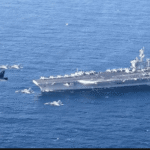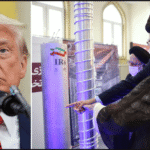Maldives’ Main Opposition Party Welcomes Recalibration of India Policy by Muizzu-led Government:-
The Maldives, a picturesque archipelago in the Indian Ocean, has long been a focal point of geopolitical interest due to its strategic location and its significance in regional security dynamics. The country’s foreign policy, especially its relationship with India, has been a subject of intense debate and scrutiny over the years. Recently, the main opposition party in the Maldives, the Maldivian Democratic Party (MDP), welcomed the recalibration of India policy by the newly elected government led by President Mohamed Muizzu. This move is seen as a significant shift in the Maldives’ foreign policy, reflecting the changing dynamics in the Indian Ocean region.
Background: Maldives-India Relations
The relationship between the Maldives and India has been characterized by deep historical, cultural, and economic ties. India has traditionally been one of the closest allies of the Maldives, providing economic assistance, defense cooperation, and emergency support in times of need. Over the years, India has played a crucial role in the Maldives’ development, including infrastructure projects, education, healthcare, and capacity building. 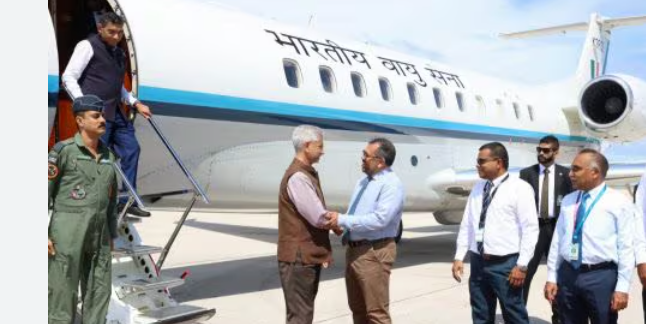 for more information click on this link
for more information click on this link
India as the First Responder
One of the key aspects of the Maldives-India relationship has been India’s role as the “first responder” in times of crisis. Whether it was during natural disasters, political unrest, or economic challenges, India has consistently been the first country to extend a helping hand to the Maldives. This has fostered a sense of trust and reliability between the two nations, with the Maldives often referring to India as its closest and most dependable partner.
The Muizzu-Led Government and Its India Policy
The election of President Mohamed Muizzu marked a new chapter in the Maldives’ political landscape. The Muizzu-led government has made it clear that it intends to recalibrate the country’s foreign policy, with a particular focus on its relationship with India. This recalibration has been welcomed by the Maldivian Democratic Party (MDP), which has historically been a strong advocate for close ties with India.
Recalibration: What It Means
The recalibration of India policy by the Muizzu-led government involves a reassessment of the Maldives’ strategic priorities and its approach to regional and international relations. This shift is seen as an effort to strike a balance between maintaining strong ties with India while also engaging with other global powers. The recalibration reflects the recognition of India’s vital role in the Maldives’ security and economic well-being, while also acknowledging the need for a diversified foreign policy that takes into account the changing geopolitical realities of the Indian Ocean region. 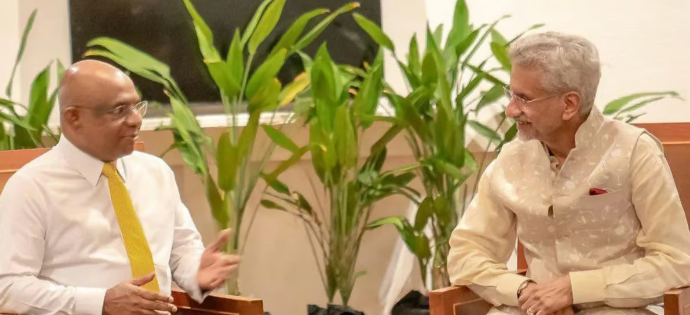 for more information click on this link
for more information click on this link
The MDP’s Perspective
The Maldivian Democratic Party (MDP) has expressed strong support for the recalibration of India policy, viewing it as a positive step towards strengthening the Maldives’ position on the global stage. The MDP has emphasized that maintaining a close and cooperative relationship with India is essential for thelong-term stability and prosperity. The party has also highlighted India’s consistent support for the Maldives, particularly in times of crisis, as a key factor in the importance of the bilateral relationship.
The Strategic Importance of the Maldives in the Indian Ocean
The Maldives’ location in the Indian Ocean makes it a strategically important player in regional security dynamics. The Indian Ocean is a crucial maritime route for global trade, and the Maldives’ position along these sea lanes gives it significant geopolitical importance. As major powers, including India, China, and the United States, seek to expand their influence in the region, the Maldives finds itself at the center of a strategic competition that has far-reaching implications for regional security.
India’s Strategic Interests
India views the Maldives as a critical partner in ensuring the security and stability of the Indian Ocean region. The proximity of the Maldives to India’s southern coast makes it a key player in India’s maritime security strategy. India has invested in strengthening defense and security cooperation with the Maldives, including joint military exercises, intelligence sharing, and capacity building. The recalibration of India policy by the Muizzu-led government is seen as a reaffirmation of the commitment to maintaining strong security ties with India.
The China Factor
In recent years, China has also sought to expand its influence in the Maldives, as part of its broader Belt and Road Initiative (BRI). This has led to concerns in India about the potential for increased Chinese presence in the Indian Ocean, which could challenge India’s strategic interests. The previous Maldivian government had pursued closer ties with China, leading to a cooling of relations with India. However, the recalibration of India policy by the Muizzu-led government is seen as a move to rebalance the Maldives’ foreign policy and avoid over-reliance on any single external power.
The Role of the Maldivian Democratic Party (MDP)
The Maldivian Democratic Party (MDP), led by former President Mohamed Nasheed, has been a strong proponent of close ties with India. The has consistently advocated for a foreign policy that prioritizes therelationship with India, recognizing the importance of India as a reliable partner in times of need. The party’s support for the recalibration of India policy by the Muizzu-led government reflects its commitment to maintaining a balanced and pragmatic foreign policy that serves the Maldives’ national interests.
MDP’s Vision for Maldives-India Relations
The MDP envisions a relationship with India that is based on mutual respect, trust, and cooperation. The party believes that a strong partnership with India is essential for the economic development, security, and regional standing. The MDP has also emphasized the importance of people-to-people ties between the two countries, including cultural exchanges, educational opportunities, and tourism.
President Nasheed’s Role
Former President Mohamed Nasheed, a key figure in the MDP, has played a significant role in shaping the foreign policy during his tenure. Nasheed’s tenure was marked by a strong emphasis on democratic reforms, human rights, and environmental sustainability. He also sought to strengthen the Maldives’ ties with India and other democratic nations. Nasheed’s influence within the MDP and his continued advocacy for close ties with India have been instrumental in shaping the party’s approach to foreign policy.
The Recalibration of India Policy: Implications for Regional Security
The recalibration of India policy by the Muizzu-led government has significant implications for regional security in the Indian Ocean. The’ decision to reaffirm its ties with India while engaging with other global powers reflects a pragmatic approach to navigating the complex geopolitical landscape of the region.
Strengthening Security Cooperation
The recalibration is expected to lead to a further strengthening of security cooperation between India and the This could include enhanced maritime security collaboration, joint exercises, and intelligence sharing. Such cooperation is essential for addressing common security challenges, including piracy, terrorism, and illegal fishing. The Maldives’ strategic location makes it a crucial partner for India in securing the Indian Ocean region.
Balancing External Influences
The recalibration also reflects the Maldives’ desire to balance external influences in its foreign policy. While maintaining close ties with India, the Maldives is likely to continue engaging with other global powers, including China, the United States, and the European Union. This balanced approach allows thto leverage its strategic position while avoiding over-dependence on any single country. The Muizzu-led government’s recalibration of India policy is thus seen as a move towards a more diversified and independent foreign policy.
Impact on Regional Diplomacy
The recalibration of India policy by the is likely to have broader implications for regional diplomacy. The Indian Ocean region is witnessing increased competition among major powers, and the foreign policy decisions will play a key role in shaping the regional security architecture. By reaffirming its ties with India, the Maldives is signaling its commitment to a stable and secure Indian Ocean region, which is in the interests of all regional stakeholders.
Economic and Developmental Implications
The recalibration of India policy also has significant economic and developmental implications for the Maldives. India has been a key partner in the Maldives’ development journey, providing assistance in areas such as infrastructure, healthcare, education, and disaster management. The recalibration is expected to strengthen economic ties between the two countries, leading to increased investment, trade, and tourism.
Infrastructure Development
India has been involved in several infrastructure projects in the Maldives, including the construction of airports, ports, and roads. The recalibration of India policy is likely to lead to the continuation and expansion of these projects, contributing to the Maldives’ economic growth and development. The Indian government has also extended lines of credit to the Maldives for various developmental projects, further strengthening economic ties between the two nations. 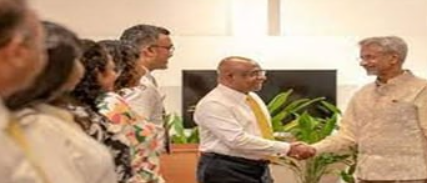 for more information click on this link
for more information click on this link
Tourism and People-to-People Ties
Tourism is a major contributor to the Maldivian economy, and India is one of the largest source markets for tourists to the Maldives. The recalibration of India policy is expected to boost tourism between the two countries, leading to increased people-to-people ties and cultural exchanges. The ‘ decision to maintain close ties with India is also likely to encourage more Indian tourists to visit the island nation, providing a boost to the local economy.
Capacity Building and Human Resource Development
India has been a key partner in building thecapacity in various sectors, including healthcare, education, and disaster management. The recalibration of India policy is expected to lead to continued collaboration in these areas, with India providing technical assistance, training, and scholarships to Maldivian students and professionals. This partnership is crucial for the Maldives’ long-term development and for building a skilled workforce that can contribute to the country’s growth.
Conclusion:
The recalibration of India policy by the Muizzu-led government marks a significant shift in the Maldives’ foreign policy, reflecting the changing dynamics of the Indian Ocean region. The Maldivian Democratic Party’s support for this recalibration underscores the importance of maintaining strong and cooperative ties with India, which has historically been the Maldives’ most reliable. ALSO READ:-Russia Blocks Signal Messaging App Amid Tightening Control Over Information: A Deep Dive into the Implications 2024

